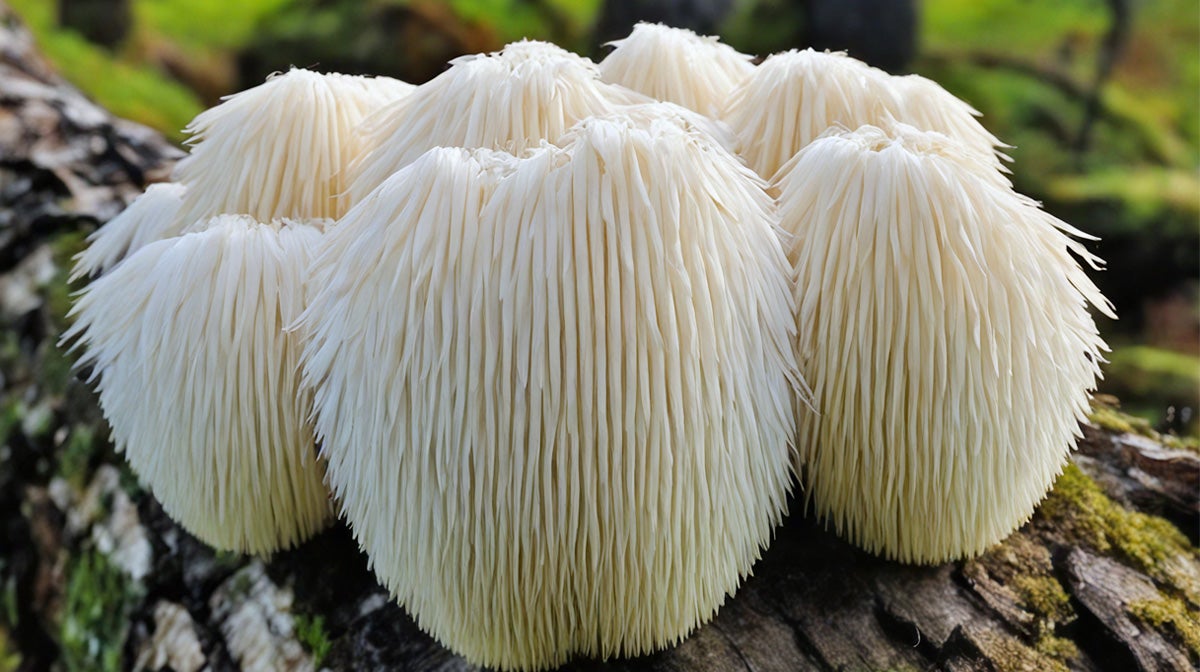
Shaggy, white, and almost, dare I say, cute, lion’s mane is a mushroom that has been around for hundreds of years as a staple in traditional Chinese and Japanese medicine.
Named for its distinctive appearance — imagine a marshmallow with a grown-out fringe — it has become increasingly popular in supplements for its versatility and potential benefits for cognitive health and general wellness.
- What is Lion's Mane?
- Is Lion's Mane an Adaptogen?
- What is Lion's Mane Good For?
- Benefits of Lion's Mane
- When is the Best Time to Take Lion's Mane?
- How to Take Lion's Mane Mushrooms
- FAQs

What is Lion’s Mane?
Lion’s mane, or Hericium erinaceus to use its scientific name, is a species of mushroom widely used in cooking and supplements. Abundant in East Asia, it has been used in traditional medicine for centuries and its health-promoting effects are well documented.1
Is Lion’s Mane an Adaptogen?
Yes, lion’s mane is often classified as an adaptogen. Adaptogens help the body adapt to stress and restore balance, making lion’s mane a popular choice for those looking to minimize stress, reduce anxiety, and combat fatigue.2
What is Lion’s Mane Good For?
Lion’s mane is considered a functional mushroom due to its long list of potential health benefits, particularly for the brain.
It’s rich in antioxidants and anti-inflammatory properties, and research suggests that it may enhance focus, improve memory, and support both cognitive health and overall wellness.3

Benefits of Lion’s Mane
Cognitive function
Lion’s mane has been shown to enhance cognitive functions, particularly memory and concentration. Studies suggest its bioactive compounds may improve mental clarity, reduce brain fog, and support learning processes.4
Another benefit may be protection against cognitive decline. A standout feature of lion’s mane is its apparent ability to stimulate the production of nerve growth factor (NGF), a protein essential for the survival and growth of neurons.5 Increased NGF levels may contribute to brain health, potentially lowering the risk of degenerative diseases.6
Mood
Early research suggests that lion’s mane may help reduce symptoms of anxiety and depression, possibly due to its anti-inflammatory properties and influence on brain-derived neurotrophic factor (BDNF), which can boost mood and emotional well-being.7
Digestion
With its prebiotic properties, lion’s mane helps support the growth of beneficial gut bacteria, which is linked to better digestion, improved nutrient absorption, and even enhanced mood.8
Immune health
Lion’s mane is rich in antioxidants, which help support the immune system by neutralizing free radicals in the body. Its bioactive compounds are also believed to enhance immune response and reduce inflammation, contributing to overall health and better resistance to illness.9
When is the Best Time to Take Lion’s Mane?
To get the most out of its benefits, consider taking lion’s mane in the morning as part of your routine or in the early afternoon to help boost focus, reduce brain fog, and support good function throughout the day.
How to Take Lion’s Mane Mushrooms
Unsure of the best way to take lion’s mane? While consuming the mushroom in its natural form is likely to provide the most benefits, lion’s mane is versatile and can be taken with meals or supplemented as part of a balanced diet.
Available in capsules, powders, and gummies, lion’s mane supplements are easy to add to your daily routine. Simply incorporate it into your supplement stack, smoothies, or coffee for a brain power boost.
FAQs
What are mushroom supplements?
Mushroom supplements are concentrated extracts from various fungi designed to harness their health benefits. They come in various forms, including powders, capsules, gummies, and liquid drops.
Is lion’s mane safe?
Generally, lion’s mane is considered safe. However, those with mushroom allergies or specific health conditions should consult a healthcare professional before taking any supplement for the first time.
Is lion’s mane legal?
Yes, lion’s mane is legal to buy in the US and is widely available as a supplement.
What is the best lion’s mane supplement?
It’s worth knowing what to look out for when choosing a supplement. Look for a high-quality one with a high percentage of active compounds like beta-glucans, hericenones, and erinacines.
Take Home Message
Containing key compounds for brain function and overall health, lion’s mane is a popular choice for those looking to reduce stress and sharpen their focus. If you’re looking to boost your brain power, support mood, or promote immune health, it might be worth making room in your supplement stack for this unique mushroom.
Find more here:

The Carnivore Diet | Food List, Benefits, and Side Effects
Is meat-only a diet dream or disaster? The know-how on this latest diet trend....

What Is Creatine? | Benefits, Dosage, & Side Effects
Cutting through the noise to provide you with the facts......

Supplement Guide for Endurance Athletes | Myprotein Training Plan
The supplements you need to fuel even your hardest workouts....

- Friedman, M., 2015. Chemistry, nutrition, and health-promoting properties of Hericium erinaceus (Lion’s Mane) mushroom fruiting bodies and mycelia and their bioactive compounds. Journal of agricultural and food chemistry, 63(32), pp.7108-7123.
- Docherty, S., Doughty, F.L. and Smith, E.F., 2023. The Acute and Chronic Effects of Lion’s Mane Mushroom Supplementation on Cognitive Function, Stress and Mood in Young Adults: A Double-Blind, Parallel Groups, Pilot Study. Nutrients, 15(22), p.4842.
- Khan, M.A., Tania, M., Liu, R. and Rahman, M.M., 2013. Hericium erinaceus: an edible mushroom with medicinal values. Journal of Complementary and Integrative Medicine, 10(1), pp.253-258.
- Szućko-Kociuba, I., Trzeciak-Ryczek, A., Kupnicka, P. and Chlubek, D., 2023. Neurotrophic and neuroprotective effects of Hericium erinaceus. International Journal of Molecular Sciences, 24(21), p.15960.
- Mori, K., Inatomi, S., Ouchi, K., Azumi, Y. and Tuchida, T., 2009. Improving effects of the mushroom Yamabushitake (Hericium erinaceus) on mild cognitive impairment: A double‐blind placebo‐controlled clinical trial. Phytotherapy Research: An International Journal Devoted to Pharmacological and Toxicological Evaluation of Natural Product Derivatives, 23(3), pp.367-372.
- Li, I. C., Chang, H. H., Lin, C. H., Chen, W. P., Lu, T. H., Lee, L. Y., Chen, Y. W., Chen, Y. P., Chen, C. C., & Lin, D. P. (2020). Prevention of Early Alzheimer’s Disease by Erinacine A-Enriched Hericium erinaceus Mycelia Pilot Double-Blind Placebo-Controlled Study. Frontiers in aging neuroscience, 12, 155. https://doi.org/10.3389/fnagi.2020.00155
- Chong, P.S., Fung, M.L., Wong, K.H. and Lim, L.W., 2020. Therapeutic potential of Hericium erinaceus for depressive disorder. International journal of molecular sciences, 21(1), p.163.
- Tian, B., Geng, Y., Xu, T., Zou, X., Mao, R., Pi, X., Wu, W., Huang, L., Yang, K., Zeng, X. and Sun, P., 2022. Digestive characteristics of Hericium erinaceus polysaccharides and their positive effects on fecal microbiota of male and female volunteers during in vitro fermentation. Frontiers in nutrition, 9, p.858585.
- Hsu, C.H., Liao, E.C., Chiang, W.C. and Wang, K.L., 2023. Antioxidative Activities of Micronized Solid-State Cultivated Hericium erinaceus Rich in Erinacine A against MPTP-Induced Damages. Molecules, 28(8), p.3386.







